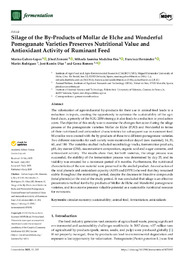Por favor, use este identificador para citar o enlazar este ítem:
https://hdl.handle.net/11000/37068Registro completo de metadatos
| Campo DC | Valor | Lengua/Idioma |
|---|---|---|
| dc.contributor.author | Gálvez López, Marina | - |
| dc.contributor.author | Zemzmi, Jihed | - |
| dc.contributor.author | Ilea, Mihaela Iasmina Madalina | - |
| dc.contributor.author | Hernández García, Francisca | - |
| dc.contributor.author | Rodríguez, Martín | - |
| dc.contributor.author | Díaz Sánchez, José Ramón | - |
| dc.contributor.author | Romero, Gema | - |
| dc.contributor.other | Departamentos de la UMH::Producción Vegetal y Microbiología | es_ES |
| dc.date.accessioned | 2025-07-30T12:11:07Z | - |
| dc.date.available | 2025-07-30T12:11:07Z | - |
| dc.date.created | 2025-07 | - |
| dc.identifier.citation | Fermentation 2025, 11(7), 392 | es_ES |
| dc.identifier.issn | 2311-5637 | - |
| dc.identifier.uri | https://hdl.handle.net/11000/37068 | - |
| dc.description.abstract | The valorization of agro-industrial by-products for their use in animal feed leads to a reduction in inputs, creating the opportunity to optimize the sustainability of the agrifood chain, a priority of the SDG 2030 strategy; it also leads to a reduction in production costs. The objective of this study was to examine the changes that occur during the silage process of the pomegranate varieties Mollar de Elche (PDO) and Wonderful in terms of their nutritional and antioxidant characteristics for subsequent use in ruminant feed. Microsilos were created with the by-products of these two different pomegranate varieties. Two different microsilos for each variety were monitored on days 0 (raw material), 14, 35, 60, and 180. The variables studied included microbiology tracks, fermentation products, pH, dry matter (DM), macronutrient composition, organic acid and sugar contents, and antioxidant activity. The results show that, for both varieties, the silage process was successful; the stability of the fermentation process was determined by day 35, and its viability was ensured for a minimum period of 6 months. Furthermore, the nutritional characteristics of the raw material were preserved in the ensiled product. An evaluation of the total phenols and antioxidant capacity (ABTS and DPPH) showed that they remained stable throughout the monitoring period, despite the decrease in bioactive compounds (total phenols) at the end of the study period. It was concluded that silage is an effective preservation method for the by-products of Mollar de Elche and Wonderful pomegranate varieties, and its outcome presents valuable potential as a sustainable nutritional resource for ruminants. | es_ES |
| dc.format | application/pdf | es_ES |
| dc.format.extent | 15 | es_ES |
| dc.language.iso | eng | es_ES |
| dc.publisher | MDPI | es_ES |
| dc.rights | info:eu-repo/semantics/openAccess | es_ES |
| dc.rights.uri | http://creativecommons.org/licenses/by-nc-nd/4.0/ | * |
| dc.subject | circular economy | es_ES |
| dc.subject | sustainability | es_ES |
| dc.subject | animal feed | es_ES |
| dc.subject | fermentation | es_ES |
| dc.subject | antioxidants | es_ES |
| dc.subject.other | CDU::6 - Ciencias aplicadas::66 - Ingeniería, tecnología e industria química. Metalurgia::663/664 - Alimentos y nutrición. Enología. Aceites. Grasas | es_ES |
| dc.title | Silage of the by-products of mollar de Elche and wonderful pomegranate varieties preserves nutritional value and antioxidant activity of ruminant feed | es_ES |
| dc.type | info:eu-repo/semantics/article | es_ES |
| dc.relation.publisherversion | https://doi.org/10.3390/fermentation11070392 | es_ES |

Ver/Abrir:
fermentation-11-00392.pdf
1,1 MB
Adobe PDF
Compartir:
 La licencia se describe como: Atribución-NonComercial-NoDerivada 4.0 Internacional.
La licencia se describe como: Atribución-NonComercial-NoDerivada 4.0 Internacional.
.png)